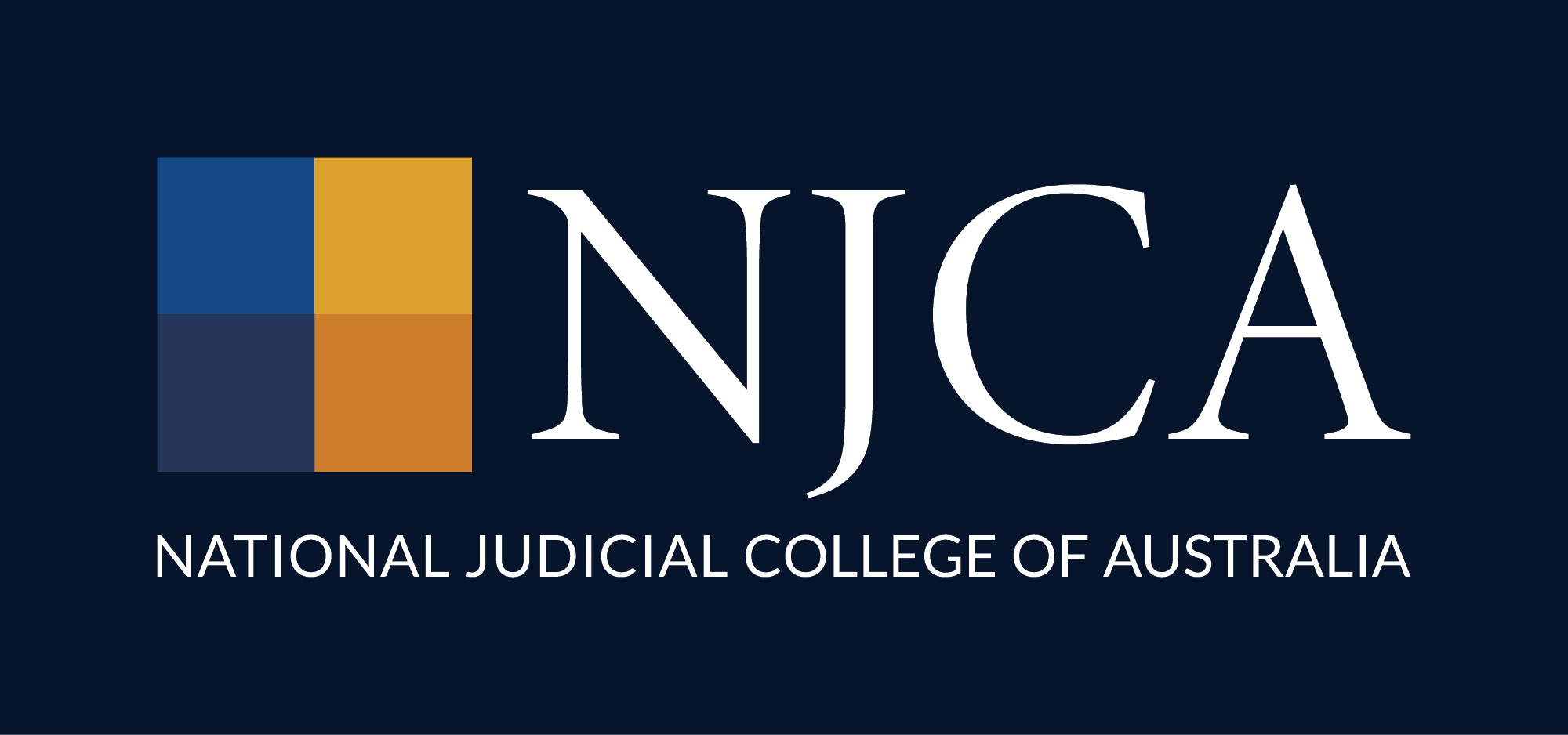Rationale
Judicial officers encounter situations in and outside the court room that require them to consider how they should conduct themselves consistently with their judicial oath and required standards of conduct. This may involve issues which raise questions in regard to appropriate judicial conduct.Aim of this Unit
Professional development activities should help judicial officers –
- to identify common problems that raise questions as to the appropriate standard of conduct required by the judicial oath or any ethical concerns
- by providing information about resources available to assist them in resolving such questions
- to consider and apply the relevant principles
- by providing guidance in regard to judicial conduct and ethical problems which arise in and outside the court room.
Application of the Core Dimensions
Substantive and Procedural Law
Programs in this unit could cover the constitutional aspects of the separation of powers and the institutional role of courts, the law and procedure concerning judicial bias and recusal applications and judicial officers’ ethical obligations and obligations pursuant to their oath.
Judge Craft Skills
Programs may consider how judicial officers’ conduct in court might give rise to ethical problems such as an apprehension of bias; how best to apply therapeutic jurisprudence principles to different kinds of court proceedings and in different areas of law; the relationship between therapeutic jurisprudence and judicial independence and impartiality;
Social Context
Programs may consider how judicial officers’ implicit biases affect decision-making; how to minimise the impact of these implicit biases in decision-making; self-reflection on and challenged implicit biases;
Attitudes and Values
Programs may consider how personal attitudes, values and implicit biases can affect the process of judging.
Each unit will require different weight to be given to each of the Core Dimensions depending on the nature of the unit, and this should be reflected in any rationale and learning outcomes of a program developed under this unit.
Independence
The courts remain independent of the other branches of government and judicial officers are not subject to improper pressure or influence when making decisions. 10
Programs
1.1 - Judicial Independence & The Role of The Judicial Officer
Aim
These programs provide judicial officers with the opportunity to consider broad issues regarding judicial independence and the institutional role of judges.
Scope
These programs could encompass:
- a consideration of the literature and official statements in regard to the role of the judiciary and of the individual judicial officer
- the effect of judicial independence on the relationship between heads of jurisdiction and judicial officers
- boundaries between administrative issues and an independent judiciary
- handling of complaints against judicial officers
- issues about the extent to which, and how, judicial officers should take some responsibility for addressing some of the problems they see before them, eg.in legislation, administration or the outcomes for the people who appear before them.
Footnotes
- Without Fear or Favour: Judicial Impartiality and the Law on Bias: Australia needs to address “a lack of co-ordination and an absence of resources to plan and develop systematic judicial education programming”, as was the central challenge facing Canada approximately 15 years ago. (p63).
- The 2007 report ‘A Curriculum for Professional Development for Australian Judicial Officers’, prepared by Chris Roper, AM
- For a complete list of references, please see Annexure A.
- National Standard for Professional Development for Australian Judicial Officers 2006, adopted by the NJCA and endorsed by the Council of Chief Justices, the Council of Chief Judges and the Council of Chief Magistrates, as well as the Judicial Commission of New South Wales, the Judicial College of Victoria, the Australasian Institute of Judicial Administration, the Judicial Conference of Australia and the Association of Australian Magistrates. A review of impact of the Standard was undertaken in 2010 by Christopher Roper.
- For an additional discussion of this issue, see speech by former Chief Justice Robert French, Judicial Education - A Global Phenomenon, The International Organisation for Judicial Training, The Fourth International Conference on the Training of the Judiciary, Sydney, 26 October 2009
- Attaining Judicial Excellence: A Guide for the NJCA, 2019
- The Honourable Justice J Allsop AO, Continuing Judicial Education: the Australian experience, Judcom, Handbook for Judicial Officers – the role of judicial education
- Justice Stephen Gageler, Keynote Address, NJCA 20th Anniversary, 8 December 2022
- Australian Law Reform Commission, Without Fear or Favour: Judicial Impartiality and The Law on Bias, ALRC Report No 138 (December 2021) at [12.78]
- See Forge v ASIC (2006) 228 CLR 45, 80 (Gummow, Hayne and Crennan JJ) (‘judicial independence refers not only to independence from the Executive, it refers to independence from other sources of influence’); Rebecca Ananian-Welsh and Jonathan Crowe (eds), Judicial Independence in Australia (Federation Press 2016); Rebecca Ananian-Welsh and George Williams, ‘Judicial Independence from the Executive: A First Principles Review of the Australian Cases’ (2014) 40(3) Monash Law Review 593.
- Alan Rose, ‘The Model Judiciary – Fitting in with Modern Government’ (1999) 4 The Judicial Review 323, 326. See also Ebner v Official Trustee in Bankruptcy (2000) 205 CLR 337, [80] (Gaudron J) (‘Impartiality and the appearance of impartiality are so fundamental to the judicial process that they are defining features of judicial power’)
- TCL Air Conditioner (Zhongshan) Co Ltd v Judges of the Federal Court of Australia (2013) 251 CLR 533 [27] (French CJ and Gageler J) (the judicial process involves ‘…observance of the rules of procedural fairness.’)
- The Hon Stephen Gageler AC, ‘Judicial Legitimacy’ (2023) 97 Australian Law Journal 28, 28, and Appleby and Roberts, “Studying judges: The role of the Chief Justice, and other institutional actors”, and “The Chief Justice Under Relational and Institutional Pressure, ” Cambridge University Press 4 May 2021
- See Australian Law Reform Commission, Report 89: Managing Justice (2000) 190 (noting that judicial education can create ‘economies of scale and other matters relating to efficiency.’)
- See Russell v Russell (1976) 134 CLR 495, 520 (Gibbs J) (‘the public administration of justice tends to maintain confidence in the integrity and independence of the courts. The fact that courts of law are held openly and not in secret is an essential aspect of their character. It distinguishes their activities from those of administrative officials, for “publicity is the authentic hallmark of judicial as distinct from administrative procedure.” To require a court invariably to sit in closed court is to alter the nature of the court’); Commissioner of the Australian Federal Police v Zhao (316 ALR 378, [44] (French CJ, Hayne, Kiefel, Bell and Keane JJ) (‘the rationale of the open court principle is that court proceedings should be subjected to public and professional scrutiny, and courts will not act contrary to the principle save in exceptional circumstances.’)
- Sir Gerard Brennan, ‘The State of the Judicature’ (1998) 73 Australian Law Journal 33, (‘If we are to be governed by the rule of law, we must have a judicature to administer it. The characteristics of that judicature reflect the functions it is charged to perform…[It] must be a competent judicature; there must be judges and practitioners who know the law and its purpose, who are alive to the connection between abstract legal principle and its practical effect, who accept and observe the limitations on judicial power and who, within those limitations, develop or assist in developing the law to answer the needs of society from time to time.’)
- Three I’s: Independence, Impartiality and Integrity <https://www.judiciary.uk/about-the-judiciary/our-justice-system/three-is/>; The Hon Stephen Rares, ‘What is a Quality Judiciary?’ (2011) 20 Journal of Judicial Administration 133, 138 (‘Judicial integrity is bound up with impartiality. The public must be able to have confidence that the judge is honest in all aspects of his or her conduct. Intellectual honesty is as vital as integrity in other spheres of a judge’s life.’)
- Judicial Legitimacy”, The Hon Justice Stephen Gageler of the High Court of Australia, a paper delivered at the 2022 AJOA Colloquium on 7 October 2022.


